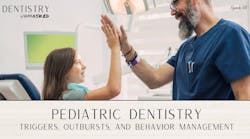Teen dental caries and screen time: A growing concern for today’s dental practice
Key Takeaways
- Excessive screen time in teens is linked to higher caries risk due to poor oral hygiene, increased bruxism, and frequent consumption of sugary, acidic snacks during digital activities.
- Daily video gaming is associated with a significantly higher prevalence of severe gingivitis and caries; dental teams should routinely ask about screen and gaming habits during adolescent visits.
- Elevated stress markers (salivary cortisol) and decreased pH levels observed in teens playing violent or competitive games may contribute to an oral environment more prone to enamel demineralization.
- RDHs can play a critical role by screening for early signs of erosion and gingival inflammation, and initiating conversations about tech-related habits with patients and parents during preventive visits.
Rampant dental caries in teenagers is one of the most heartbreaking trends dentists encounter. While good oral hygiene habits are essential at every age, adolescence is a critical window—bad habits during these years often lead to a lifetime of dental anxiety, frequent treatment, and chronic oral discomfort. Today’s teens are exposed to more unhealthy behaviors earlier than ever. In this article, we’ll explore the top habits causing cavities, gum disease, and dental anxiety in adolescents, and how parents and providers can intervene.
The link between screen time and poor oral hygiene in teens
Smartphones, video games, streaming services, and social media are more accessible than ever—and teen screen time is at an all-time high. Multiple studies have linked excessive electronic media use to:
-
Poor oral hygiene
-
Higher rates of bruxism
-
Increased consumption of cariogenic foods
-
Greater risk of periodontal disease
-
Elevated dental anxiety
A study in Poland evaluated over 1,600 18-year-olds who used computers for more than 3 hours a day. These teens showed more unfilled cavities, poorer brushing habits, and a higher risk of gingival bleeding compared to their peers. The research is clear: excessive screen time increases the risk of oral health problems in adolescents.
Video games and cavities: An overlooked oral health risk
A 2023 study looked at 144 children ages 6–12 and found that daily video gamers were over 3.5 times more likely to have severe gingivitis and advanced caries compared to occasional gamers. As kids grow into adolescence, this gap may only widen.
But it’s not just how much they play—it’s what they play. A 2022 study on Internet Gaming Disorder and stress hormones found that teens playing aggressive or violent games had significantly higher levels of salivary cortisol, the body’s primary stress hormone. Females in this group also had a lower salivary pH, a red flag for increased acid erosion and cavity risk. These biochemical changes may explain why gaming behavior can directly affect both oral and systemic health.
Screen time and sugar: A double threat to teen dental health
Beyond stress and neglect, screen time is strongly tied to increased snacking—especially on high-sugar, acidic foods. A 2023 study of nearly 500 children ages 8–14 found that those with more than 2 hours of daily screen time were significantly more likely to:
-
Snack between meals (87.2% vs. 12.2%)
-
Buy sugary snacks and drinks (92.1% vs. 7.6%)
-
Regularly consume chips, chocolate, and packaged juices (93.5% vs. 6.1%)
This steady diet of sugar and acid, especially when paired with poor oral hygiene, dramatically increases the risk of tooth decay, enamel erosion, and gum disease.
Can video games actually improve kids’ oral health?
It’s not all bad news. What if we could use screen time as a tool to improve teen oral health? One study did just that. Researchers studied 278 children ages 6–8 to evaluate the impact of an oral health education video game on both kids and their parents. The results?
-
Kids had significantly better dietary knowledge after gameplay
-
Parents gained awareness of fluoride varnish and preventive treatments
-
Both groups showed improved understanding of oral hygiene best practices
The takeaway: gamified oral health education can be effective, especially when it targets both children and parents.
What dentists and parents can do to help teens build better habits
If we want to reduce rampant cavities and dental anxiety in adolescents, we must start early—and get creative. Dentists should use routine visits to:
-
Educate both teens and parents about screen time risks
-
Promote gamified oral health tools and mobile apps
-
Emphasize the importance of nutrition, hydration, and stress management
-
Discuss preventive care like fluoride varnish and sealants
With proactive education and strategic use of digital tools, we can help the next generation avoid a lifetime of dental problems—and transform screen time from a risk into an opportunity.
Editor's note: This article originally appeared in DE Weekend, the newsletter that will elevate your Sunday mornings with practical and innovative practice management and clinical content from experts across the field. Subscribe here.
References
- Ruan L. Effects of Electronic Gaming on the Oral Health of Children. Thesis. University of Illinois Chicago; 2023. https://www.proquest.com/openview/76b55f442cdf56e8911b09b75560f539/1
-
Olczak-Kowalczyk D, Tomczyk J, Gozdowski D, Kaczmarek U. Excessive computer use as an oral health risk behaviour in 18-year-old youths from Poland: A cross-sectional study. Clin Exp Dent Res. 2019;5(3):284-293. Published 2019 May 1. doi:10.1002/cre2.183
-
Mustuloğlu Ş, Tezol Ö. Video game playing and oral health in school-age children: A cross-sectional study in Turkey. J Paediatr Child Health. 2023;59(11):1230-1237. doi:10.1111/jpc.16486
-
Balaganesh S, Balasubramaniam A, Indiran MA, Rathinavelu PK, Kumar MPS. Determination of salivary cortisol and salivary pH level in gaming teenagers - A cross-sectional study. J Oral Biol Craniofac Res. 2022;12(6):838-842. doi:10.1016/j.jobcr.2022.09.005
-
Garg N, Khatri A, Kalra N, Tyagi R. The association of screen time with intake of potentially cariogenic food and oral health of school children aged 8-14 years-a cross-sectional study. J Clin Pediatr Dent. 2023;47(5):116-123. doi:10.22514/jocpd.2023.060
-
Aljafari A, ElKarmi R, Nasser O, Atef A, Hosey MT. A Video-Game-Based Oral Health Intervention in Primary Schools-A Randomised Controlled Trial. Dent J (Basel). 2022;10(5):90. Published 2022 May 19. doi:10.3390/dj10050090
About the Author
Michael Massoud, DMD
Michael Massoud, DMD, earned his dental degree from Temple University and a BA in biological sciences from Rutgers. He treats patients like family, combining a passion for the art and science of dentistry with strong interpersonal care. A fellow of the International Dental Implant Association and member of the NJDA and ADA, he focuses on continuing education in aesthetic and restorative dentistry. Originally from Montreal and raised in an Egyptian household, Dr. Massoud is fluent in English, French, and Arabic. In his free time, he enjoys soccer, traveling, and spending time with his wife, Sherri, and their loved ones.


